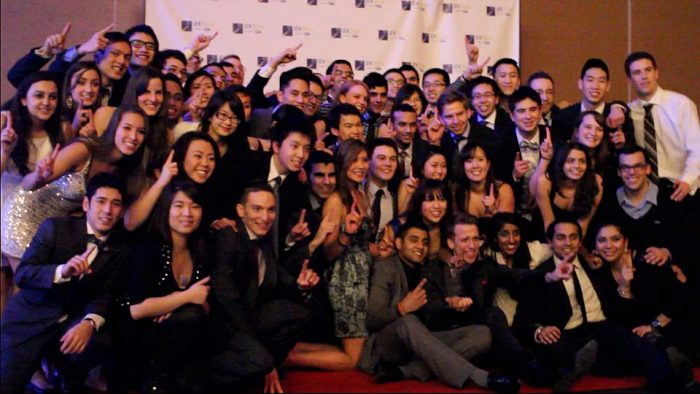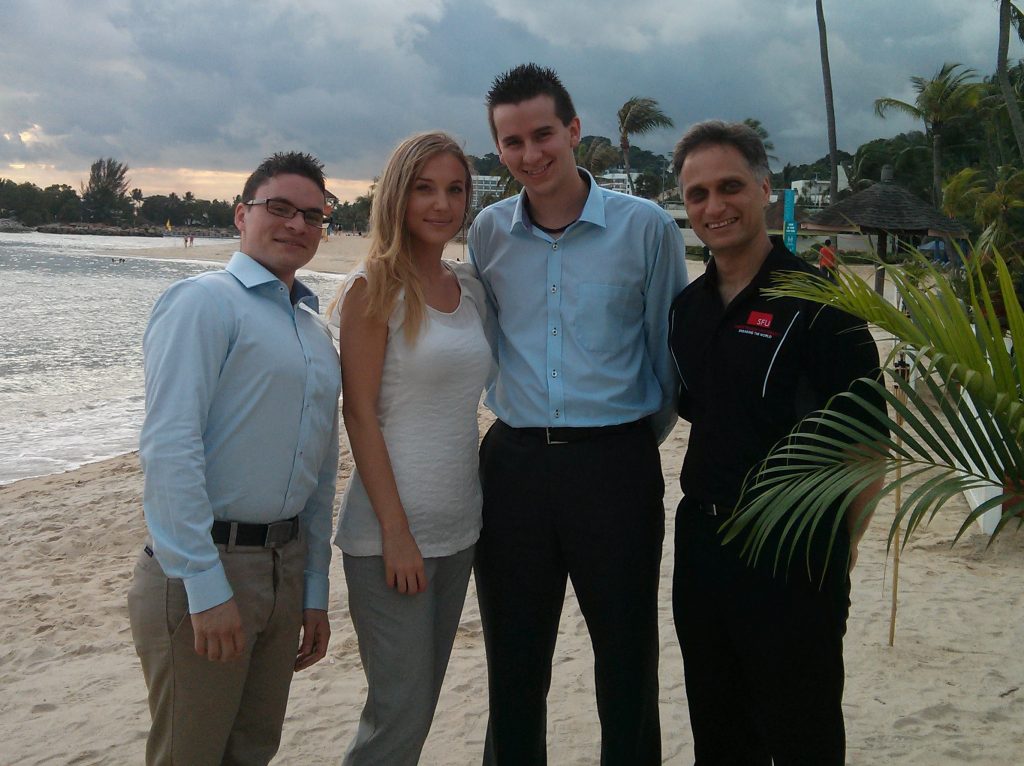On the case
Aug 14, 2013

The 2013 Beedie School of Business JDC West team took home the title of Academic School of the Year.
Beedie sets new standards for case competition training – and results.
In 2012, the spring semester of undergraduate business case competitions saw Beedie School of Business teams achieve some strong results, including a podium finish for the APEX Business-IT Global Case Challenge team. However, despite some admirable performances, the consensus was that the school’s students were capable of achieving even more.
Fast forward one year, and the 2013 spring semester saw Beedie School of Business teams achieve podium finishes at every single undergraduate case competition entered: the International Case Competition @ Maastricht, the APEX Business-IT Global Case Challenge, the Belgrade Business International Case Competition, the Royal Roads University International Undergraduate Case Competition, and JDC West, where the Beedie School of Business took home the coveted title of Academic School of the Year.
The incredible string of successes came at the same time that students from Beedie’s MBA and MSc Finance programs were racking up first place victories at the HEC Montreal Sustainability Case Competition, the RISE Balanced Fund Portfolio Competition in Ohio, and the Intercollegiate Business Ethics Case Competition in San Diego.
These impressive undergraduate achievements are no accident. Rather, they are the result of a concentrated effort to cultivate a culture of case competition success among the Beedie School’s undergraduate students through an intensive training process – one designed specifically to prepare students for the demands of top-tier international competitions.
The Case Competition Cohort is an eight-week intensive training program focusing on skills such as basic presentation, teamwork and case analysis. Upon completion of the program, students are selected by faculty coaches to go on and train for a further three months for their respective competitions.
“We wanted to create a program that would develop the core skills of students, so that when they begin training with their faculty coaches they are already in possession of the skills needed to succeed,” says Tara Immell, coordinator, undergraduate case competitions at the Beedie School of Business, and assistant coach of the 2013 Royal Roads team.
Launched in summer 2012, the intensive program helps ensure that as many students as possible are prepared to reap the benefits of case competition experience. Rather than focus on training a select few students to participate in every competition like many other universities, Beedie aims to have each student compete at only one top-tier, international competition.
“Case competitions are a fantastic experiential learning opportunity,” says Immell. “Students gain experience in practical application of their business skills, learn to work under pressure, enhance their understanding of professionalism, and benefit from the experience of faculty, alumni and industry mentors. The students have to dedicate themselves to prioritize the competition training, but in return they receive the opportunity to travel to compete against top schools and stand in front of industry judges – it’s an experience that forces them to be their best.”
In addition to preparing students for competition, the program has served to foster a sense of camaraderie among the students. Previously, teams would train separately with little interaction, but with the introduction of the case competition cohort program, participating students now train as a group for at least 60 hours before splitting into their respective teams. The close-knit bond the students develop in the training program is part of the reason for the school’s formidable increase in competition success, with cohort members pushing each other on to achieve new heights.
“As the last team to compete in a competition this semester, and with every other team having reached the podium, the pressure on us to perform was unbelievable,” says APEX team member Carlos Hernandez. “There was no way we were not going to get at least third place.”
The success of the program hinges on tremendous support from Beedie School of Business faculty, and industry experts, both of which can offer their services in a number of ways, from coaching teams to delivering guest lectures, or offering their services as a judge in a mock competition. In return, they receive the opportunity to work closely with motivated students striving to improve their skills.
Beedie associate professor Peter Tingling, who acted as faculty coach of the 2013 International Case Competition @ Maastricht team, and is chair of the case competition committee, is a firm believer in the benefits of case competition experience for students.
“Case competitions offer one of the few competitive opportunities for students to utilize all of their tools in a single situation analogous to those they will encounter in the real world upon graduation,” says Tingling. “It is wonderful to see our students hold their own against other highly reputable schools, and on a personal level, coaching a team offers an opportunity to work with high performing students focused on a goal. It requires a lot of commitment, but it is very rewarding.”
“The cohort program was a great stepping-stone, providing me with the fundamentals needed to train for the competition,” says International Case Competition @ Maastricht team member Nicholas Heng. “The training is gruelling, but the different skills our team brought to the table and the advice from our coach, Peter Tingling, made it all very rewarding. The competition experience was unbelievable, and it was a thrill to meet and compete against students from across the globe.”
Despite such a marked upswing in case competition performance following the introduction of the Case Competition Cohort program, Immell is confident the program has not yet fulfilled its potential.
“We are really excited about the developments that the incoming cohort will experience,” she explains. “The students who performed so well at the spring competitions will return to help new participants strive to repeat their success. We are aiming to build a collaborative culture, and it’s really exciting to see how well the students have responded to the training.”

The Beedie School of Business APEX Business-IT Global Case Challenge team took home the silver medal. From left to right: Carlos Hernandez, Robin Orford, Kyle Krystalowich and team coach Dr. Kamal Masri.
